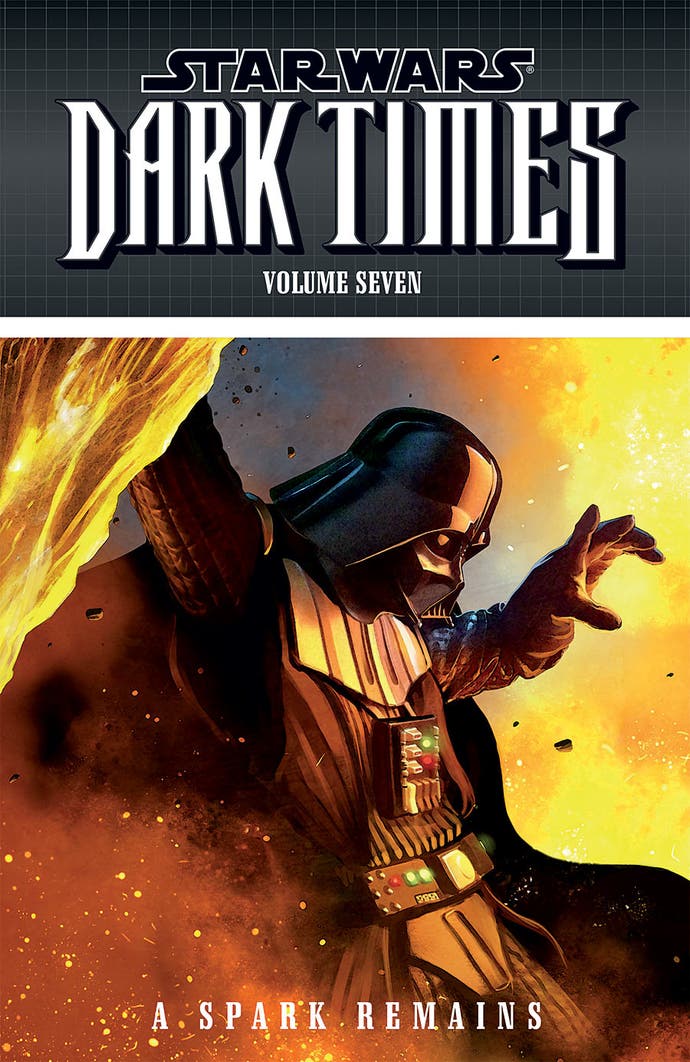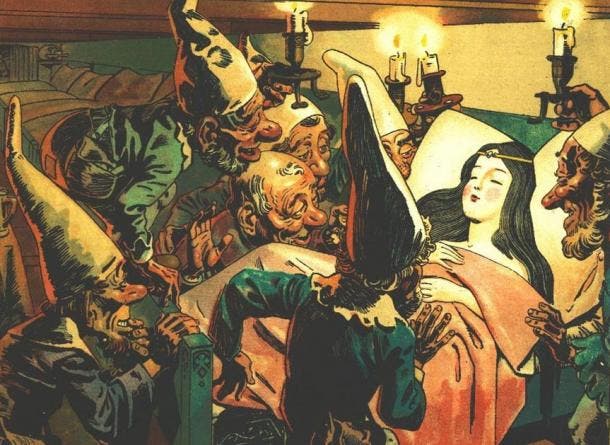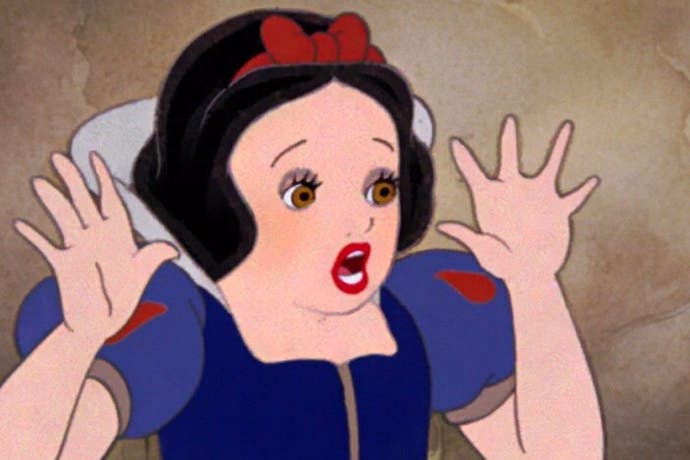Rummaging through Obsidian's drawer of game ideas
Star Wars! Snow White! Prey 2! Warhammer 40K! "There's tons of them."
Everyone has a drawer they can't close because it's stuffed too full of things. Mine has a whisk which always stops the bloody drawer from closing, and it's really annoying, but Obsidian Entertainment's drawer has around 100 game proposals in it. Game outlines in various states, from two-page snacks to 60-page feasts. "There's tons of them," Obsidian co-owner Chris Parker tells me. And for Obsidian there was never a time of greater need of an idea than summer 2012, after Microsoft cancelled Xbox One launch game Stormlands, and when South Park: The Stick of Truth was onboard THQ's sinking ship. It spurred a period now referred to in Obsidian history as the Summer of Proposals.
"We probably went through about 10 pitches that summer," Parker says. There was a Justice League game pitched to Warner Bros., there were two separate Might & Magic games pitched to Ubisoft, one smaller, one open-world. But the proposals Obsidian really remembers are Prey 2 and Warhammer 40K.
"Prey 2 everyone was really excited about," Parker says. This was before Dishonored developer Arkane set to work on a Prey reboot (released this year). This was in the aftermath of Bethesda shelving Human Head's Prey 2. "Ours had more ties to the old Prey," Parker says. "You're a human bounty hunter and you've gotten transplanted to where all the aliens are. You're a badass bounty hunter in this sci-fi setting."

Mechanically it was exactly what you would expect from Prey, a first-person shooter, married with what you would expect from Obsidian, a role-playing game. There was to be a big hub where you could interact with all sorts of different people, for example. On the surface it sounds a lot like where Human Head was going with Prey 2 - be a bounty hunter on an open alien planet and improve powers and gadgets along the way - but Obsidian was apparently never told much about that game. "[Bethesda] were very close-lipped about what was going on with Human Head," Feargus Urquhart, studio co-owner and CEO, says. "They had a specific 'what they wanted the game to be' - I don't actually know if that was what Human Head was working on or not."
The pitch Obsidian worked up had a lot to do with dealing with different aliens. "Usually in sci-fi games we humanise - we interpret aliens from how they would react if they were human - so we design a lot of aliens as humans in suits," Urquhart says. "What was important was having the aliens not just be aliens in suits. They have completely different desirous wants and needs, they react to different things they see, and they see things in different ways. How could we have aliens in this world really feel alien?"
There was also going to be Parkour, jetpacks and grappling hooks - mechanics "to try and take the shooter into three dimensions", Parker says. "Since it was sci-fi we really wanted to play with vertical space."
But the Prey 2 pitch didn't go anywhere. "Bethesda talked to us about the opportunity, they never promised anything," Urquhart says. Perhaps two years after buying Arkane, Bethesda had Arkane Austin in mind for the game. Whatever went down, what Arkane eventually made bared no resemblance to what Obsidian had in mind.
The Warhammer 40,000 pitch, meanwhile, was ill-fated from the start, what with THQ owning the licence at the time, and THQ being down the swanny (THQ would go bankrupt in December 2012). But Obsidian remembers it fondly. "That was a cool pitch," Urquhart says.
"The Warhammer 40K pitch is 28 pages - I just looked at it a little while ago," Chris Parker says while Urquhart, in perfect synchronisation, finds and opens the pitch on his computer and scrolls through it. It's very decorative and detailed but I don't catch any detail as he whizzes through.
"We wrote a small novel about how awesome this game would be," Parker says. "The idea was: there's a pen and paper off-shoot of 40K about the Inquisition, and it's more individual character-based and you travel around different planets." He's probably referring to Inquisitor, the 2001 Warhammer 40K spin-off, although it wasn't pen and paper. Inquisitor focused on a small group of characters: a shadowy Inquisitor with a couple of henchmen, and carte blanche to root out evil in the world (Games Workshop doesn't support Inquisitor any more but rulebooks are available online). A perfect set-up for an Obsidian RPG if ever I heard one. "We built this role-playing game about you being this new Inquisitor and having these crazy resources and going to all these planets," Parker says, "and there's nothing that's not at war in Warhammer 40K."
Obsidian even, for the umpteenth time, pitched another Star Wars game - hardly a rare occurrence, the two owners joke. "We pitch Star Wars every few years," Chris Parker says while Feargus Urquhart again whizzes through the associate pitch on his PC. It's titled Star Wars: Dark Times, referring to the Dark Horse comic series of the same name. "I'm pretty sure this is a 'between Episode 3 and Episode 4' game," he says. "In essence it was sort of how to reinterpret a modern KOTOR 3-like game within the Dark Times, that's really what that one was."
Dark Horse's Dark Times blurb reads: "Dark Times #1 is the gateway to a new era in Star Wars history, an era where the future is grim, evil is on the rise, and all paths seem to lead nowhere..." Events in Dark Times immediately follow Episode 3: Revenge of the Sith, with Darth Sidious revealed and Darth Vader created, the big meanie pantses.
Yet with EA now in control of the Star Wars game licence - and BioWare - the chances for Obsidian look slim, not that Urquhart seems deterred. "One day!" he soldiers on. "Look I try, I try."
In the end it would be none of the ideas pitched during the Summer of Proposals to rescue Obsidian but a most unlikely partnership with a Russian publisher instead: a deal to make an online tank game called Armored Warfare, which would last four and a half years. Pillars of Eternity would come from the same difficult period too, and while $4m wouldn't save the company, the knock-on publicity was invaluable.
But to have a game pitch amount to nothing pales in comparison to having a game cancelled part-way through - and Stormlands isn't the only rug Obsidian has had whipped from under its feet. In 2006, Obsidian was making a Snow White and the Seven Dwarves role-playing game for Buena Vista, the game-making division of Disney. "The idea was a prequel," Urquhart says, "a far, far prequel of Snow White."
"It was supposed to be a much darker world," Parker says. "There's a lot of dark elements to Disney but it's kind of hard to see underneath all the flowery animations. They wanted to capitalise on that and say, 'Here's a story about the Seven Dwarves in a much earlier, earlier state.' The actual character you played was going to be more of a typical RPG character, called the Prince [or Princess, presumably], a young man or young girl, and you would end up bumping into those dwarves and going on this adventure and solving all of these things."
The dwarves themselves were going to act like different tools for different situations. "They had very specific powers and you would travel with two of them," he continues, "and their powers would combine in different ways, so based on who you were fighting against you might want to have, say, these two dwarves with you because they would combine and do these different things. You would also, in a similar fashion, use them to solve different puzzles in the world. For example, this dwarf was the blue key for blue doors, so to speak."

Obsidian worked on the Dwarves game for roughly a year - but then Disney changed its mind. "I don't think it was really that big of a surprise," says Parker. "There were some fundamental differences between what Disney had originally wanted to do and what we were doing. The project we were working on was more lighthearted than they had pitched. What they had pitched originally was very very dark: the dwarves were slaves of giants in mines, then they escaped from the mines and were living on their own, and you meet up with them and they are these hardened, angry dwarves. Ours was like, 'OK yeah all that's fine but we'll leave a slightly lighter pitch on all that's going on,' so there were some disagreements there. Also the way we had taken the mechanics: we were trying to be a little bit more revolutionary and I don't think that worked for them."
Officially, though, and this was a gut-punch for Obsidian, the project was terminated for 'cause'. "In other words," says Parker, "the game we were making was not good enough."
Obsidian was told art quality specifically was the problem. "The tough thing for us was the direction we had from them was they were more concerned about the technological feasibility of having a streaming world in Unreal [3]," Urquhart says. "So we focused on the gameplay and technical aspect for the prototype we put together, so you could go around this world, go inside and outside, and then you get into a big boss fight. It just wasn't super-pretty yet. So we were told 'the art's a big problem'.
"Fast-forward 12 years," he goes on, "and we've heard more little bits and pieces." Maybe Roy Disney hadn't approved Buena Vista offering the Snow White IP out, maybe new Disney boss Bob Iger had different ideas about how classic IP should be used. "These all added up to it," Urquhart says.
What the Dwarves cancellation cost Obsidian was, agonisingly, ownership of the Alpha Protocol IP, something I talked more about in my Making of Alpha Protocol piece last week. Nevertheless, having a signed project meant Obsidian escaped layoffs, which was a blessing in itself.
Today the Summer of Proposals is long behind Obsidian, a company with all 175 people occupied, and all the proposals are safely crammed alongside many others in the studio's metaphorical drawer for rainy day. "We go back through and look on a semi-regular basis," Chris Parker says. "There are ones where we all know people are excited but for one reason or another it's never clicked - there's one from 2006 I can think of right off the top of my head I would still love to do. These things just come back up again, and maybe somebody goes in and revitalises the pitch and takes it maybe a new direction or cosmetically gives it a facelift, and then Ferg goes out and does his job to see if anybody is interested..."
"My dance," says Feargus Urquhart.
"His little horse and pony show."
Disclaimer: Travel and accommodation for this trip was provided by Paradox Interactive.



